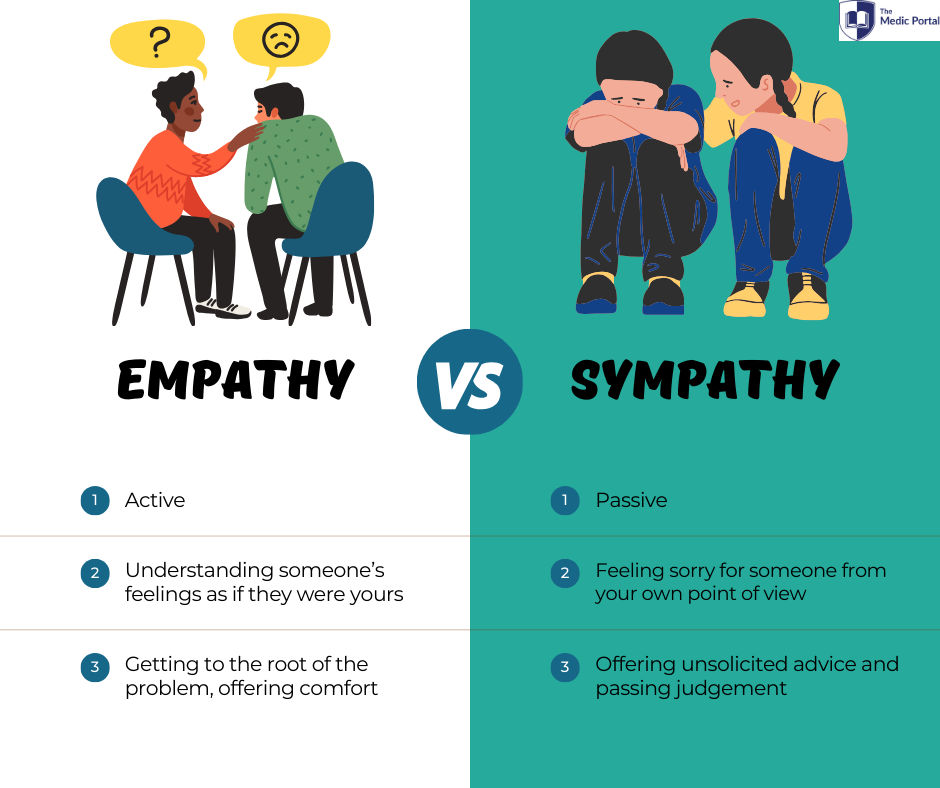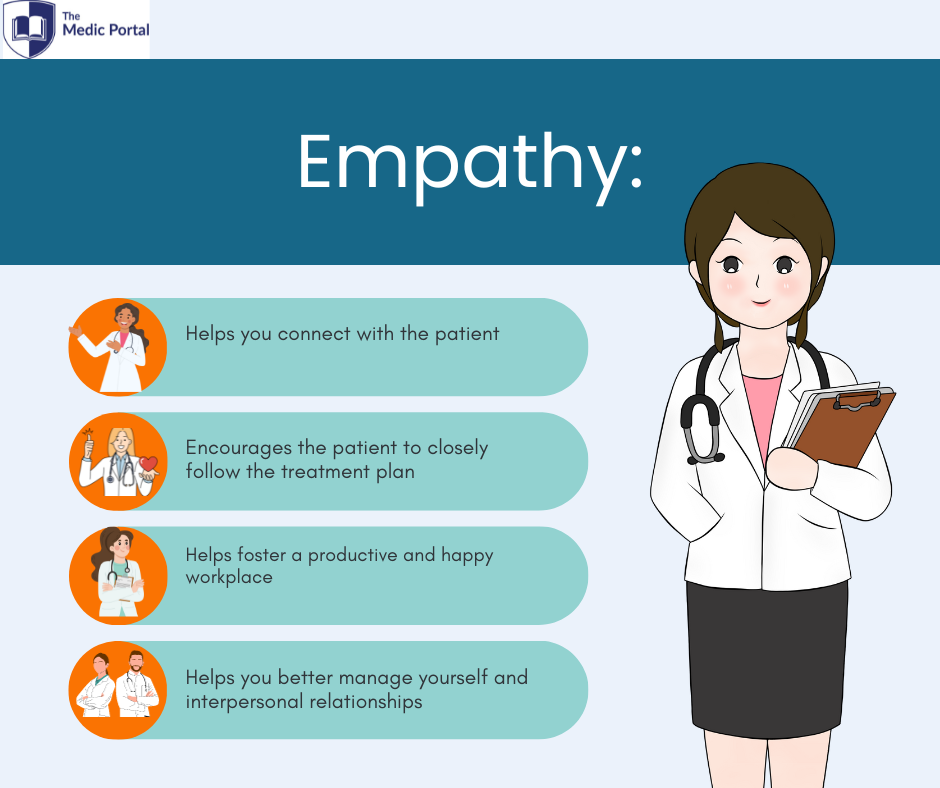What Is Empathy?
Empathy is an active ability to understand and share another person’s feelings. It allows you to see things from someone else’s point of view, understand their perspective and put yourself in their shoes.
Empathy involves:
- Being a good listener
- Acknowledging another person’s feelings
- Responding appropriately to another’s emotions and words
- Understanding non-verbal clues: body language and facial expressions
- Having a good perception of what another person might be thinking or experiencing
There are also different types of empathy that one can feel or encounter. These are:
Emotional empathy – involves understanding peoples’ emotions on a deep level, which can cause concern for someone else’s well-being or a strong feeling of distress.
Appropriate with family, friends or loved ones.
Cognitive empathy – involves understanding peoples’ thought processes and mental state on an intellectual level, such as what they might be thinking in a particular situation.
Appropriate during negotiations or at a surgeon’s offices.
Compassionate empathy – involves using emotional intelligence to respond to a situation without fully immersing yourself in it. It creates a deep connection with the person, validates their emotions and creates a safe space for the person to share their struggles.
Appropriate in most situations as it constitutes a balance between the two.
What Is Sympathy?
Unlike empathy, sympathy is often perceived as a passive connection which doesn’t allow you to truly feel what another person is experiencing. It can be easy to get confused between the two concepts. However, sympathy isn’t as useful in Medicine.
In essence, sympathy means feeling pity or sorry for someone else – but not experiencing the emotions as if you were the other person.
Sympathy, although a good feeling, can then create dangerous paradigms and patterns of caring more for some patients than others. For example, a medical worker might feel more sympathy towards a young person who is suffering seemingly ‘undeservingly’ rather than a patient with ‘lifestyle problems’, such as a smoker with lung cancer.
Sympathy involves:
- Thinking about another person’s thoughts and feelings
- Expressing opinions and giving unsolicited advice
- Judging things from a personal point of view
- Feeling sorry without understanding what another person is going through
What Is The Difference Between Empathy And Sympathy?

Both sympathy and empathy can be useful tools – but sympathy is more surface-level and can become patronising, which is something that medical professionals wish to avoid. Expressing sympathy can create a divide between you and the other person. On the other hand, you should practice empathy as it’s an essential part of the medical profession.
“I’m sorry you feel like that” is a statement that isolates someone. You’re pitying them, not providing a sense of support. To show empathy instead, you could say “Many people struggle with this issue, so you aren’t alone.” This gives the other person a sense that they are not the only one going through this and there is hope.
Advice can be an enemy of empathy in some cases. It’s about putting yourself in someone else’s shoes to understand what they are feeling – not about going into problem solving mode and offering unsolicited advice.
What Is the Difference Between Sympathy and Compassion?
As part of your interview preparation, you should also know the difference between sympathy and compassion. The term ‘compassion’ has a Latin root ‘pati’ (to suffer) and the prefix ‘com’ (with).
Unlike the other two, it communicates a desire to reduce someone’s suffering. Rather than experiencing someone’s pain, it aims to put that knowledge into action.
For example, if you were to reach out to someone and offer concrete help – you would be showing compassion. If you were trying to understand another person’s troubles – you would be showing empathy. In turn, if you were to express that you care about another person’s issues – you would be expressing sympathy.
Empathy Vs Sympathy: Examples
Example 1
A friend shares with you that they’re having issues at home – their parents are going through a divorce, and your friend is struggling to come to terms with the situation. A sympathetic response would involve giving them an advice and expressing that you can identify with the situation:
“I’ve been through that too! Have you tried talking to your parents about that? Perhaps they will discuss their options with you.”
However, if you were to practice empathy, you would carefully listen to your friend and see if this is something they’d feel comfortable talking to you about. You don’t need to fix the problem – rather, show that you are there if needed and offer meaningful support.
“I’m so sorry to hear that. Please know that I’m here for you if you want to talk about it.”
Example 2
Imagine that another student (or a co-worker) confides in you that they are struggling to keep up with their work. A sympathetic response might be: “That must be very tough for you” and give them advice as to how they can be more productive.
An empathetic response would be to have a deeper conversation to try and get to the root of why they are struggling. The second approach is more likely to be effective – and will also probably be more appreciated.
Can You Have Empathy But No Sympathy?
In general, people find it easier to sympathise than to empathise. This is because sympathy is more surface-level and doesn’t involve long and deep interactions about personal issues.
If someone is grieving, anyone can express sympathy by saying “I’m sorry for your loss” and feel bad for them. Empathy is a rarer quality and some people are more empathetic than others. If you aren’t the most naturally empathetic person, it is a skill that can be learned and developed over time if you make an effort.
Why Is Empathy Important In Medicine?

In Medicine, without empathy we would never truly understand patients and their motivations. We would ignore what makes patients individuals and force our own agendas onto them. We could feel sorry for them, but that isn’t productive and doesn’t help the patient to feel understood or empowered. Sympathy can alienate patients and make the doctor-patient relationship one-sided, unfriendly and less trustworthy.
A patient who is shown empathy is more likely to feel emotionally connected to their doctor, and therefore more likely to disclose important information that could completely change a diagnosis or treatment. They’re also more likely to follow the advice and treatment regime set out by their doctor. After all, a patient is much more likely to listen to and feel comfortable with a doctor whom they feel has truly understood their situation.
Empathy allows us to treat patients with compassion, fostering strong relationships that are mutually beneficial for the patient and the doctor. It enables patients to feel supported and understood during some of the most stressful periods in their lives.
Can Sympathy Be Harmful in Medicine?
Sympathy can potentially be harmful in medicine due to its limiting characteristics. These include:
Spatial proximity – we are more likely to feel sympathetic towards people who are close to us rather than those who are located far away.
Social proximity – we are more likely to feel sympathetic towards people we can identify with or who resembles us.
Compassion fatigue – we are more likely to feel sympathetic to a situation we find horrifying, shocking or novel. However, if the same situation repeats itself, the effect wanes. For example, if there was a big car accident in the area, we would feel immediately sympathetic. But if more accidents follow on the same day, they are unlikely to evoke the same emotional response.
As a result, sympathy can be dependent on external factors that may influence a medical specialist to feel more towards certain people than others.
Additionally, sympathy can create an uneven power dynamic isolating the other person rather than making them feel more understood and included. In turn, this inclusion is achieved with the help of empathy.
How Can I Show Empathy?

You can show empathy by reflecting the tone and language that the other person is using. Avoid using ‘I’ statements, truly listen to what the other person is saying, and put yourself in their shoes. Pay attention to how the other person is behaving as much as to what they’re saying.
You can also work on developing empathy by challenging yourself and examining your biases in different situations.
In a Medical School interview, you might be given a role play scenario where you are playing the role of a medical professional and need to have a difficult conversation with another person (played by an actor). You might need to break bad news to a patient, or speak to a colleague about a problem they are having that is affecting their work. In situations like this, it is vital to demonstrate emotional intelligence and interviewers will be looking out for empathy.
Interview Tips: Empathy vs Sympathy
First of all, understand the meaning of both terms, as well as the meaning of compassion and its difference from the other two.
Then, learn about different types of empathy and their use. Be prepared to discuss why empathy is important and why it’s preferred to sympathy in a medical setting.
During an MMI interview, you’ll have to role play with an actor who’s posing as a patient or a patient’s family member. Pay close attention to their tone, body language and facial expressions as all of these can give you additional clues as to how to respond appropriately.
Make sure to remain engaged throughout and think what you’re trying to communicate both with your words and body language.
Review our guide below for potential empathy-related questions, answers and additional tips for your interview.
